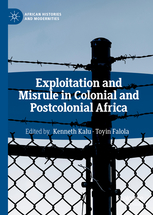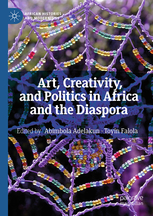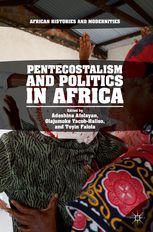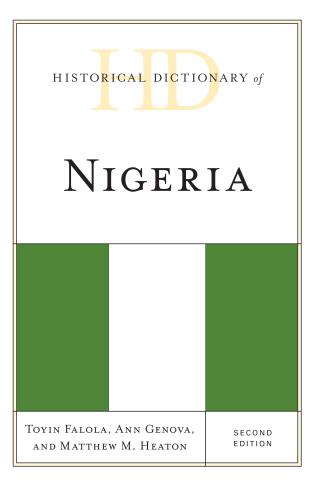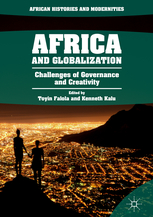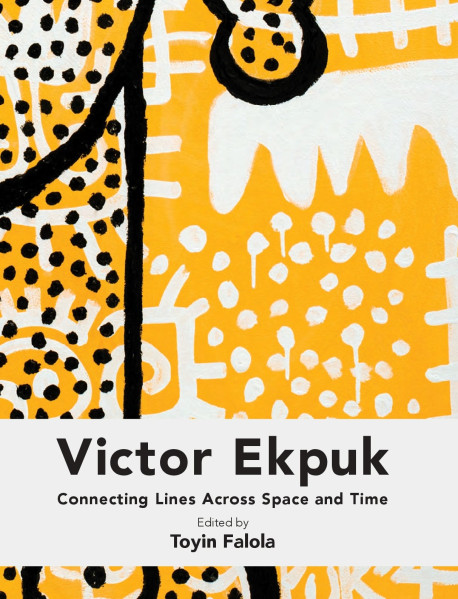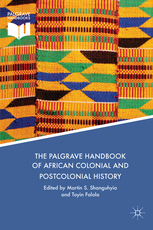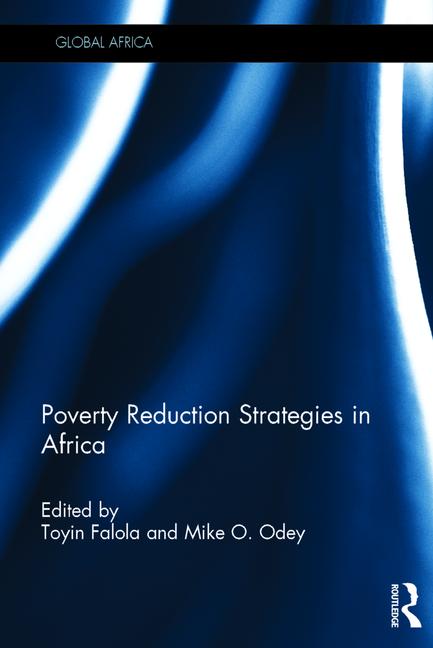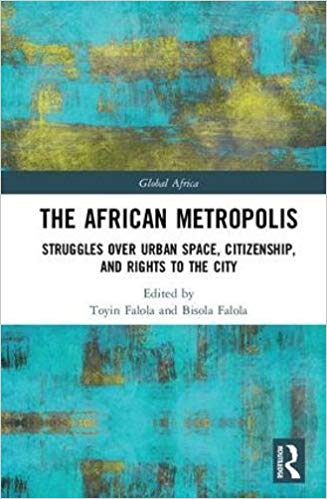Exploitation and Misrule in Colonial and Postcolonial Africa
Edited by Kenneth Kalu and Toyin Falola
This book offers new perspectives on the history of exploitation in Africa by examining postcolonial misrule as a product of colonial exploitation. Political independence has not produced inclusive institutions, economic growth, or social stability for most Africans—it has merely transferred the benefits of exploitation from colonial Europe to a tiny African elite. Contributors investigate representations of colonial and postcolonial exploitation in literature and rhetoric, covering works from African writers such as Ngugi wa Thiong’o, Kwame Nkrumah, and Bessie Head. It then moves to case studies, drawing lines between colonial subjugation and present-day challenges through essays on Mobutu’s Zaire, Nigerian politics, the Italian colonial fascist system, and more. Together, these essays look towards how African states may transform their institutions and rupture lingering colonial legacies.
Art, Creativity, and Politics in Africa and the African Diaspora
Edited by Abimbola Adelakun and Toyin Falola
This book explores the politics of artistic creativity, examining how black artists in Africa and the diaspora create art as a procedure of self-making. Essays cross continents to uncover the efflorescence of black culture in national and global contexts and in literature, film, performance, music, and visual art. Contributors place the concerns of black artists and their works within national and transnational conversations on anti-black racism, xenophobia, ethnocentrism, migration, resettlement, resistance, and transnational feminisms. Does art by the subaltern fulfill the liberatory potential that critics have ascribed to it? What other possibilities does political art offer? Together, these essays sort through the aesthetics of daily life to build a thesis that reflects the desire of black artists and cultures to remake themselves and their world.
Pentecostalism and Politics in Africa
Edited by Adeshina Afolayan, Olajumoke Yacob-Haliso, and Toyin Falola
As the epicenter of Christianity has shifted towards Africa in recent decades, Pentecostalism has emerged as a particularly vibrant presence on the continent. This collection of essays offers a groundbreaking study of the complex links between politics and African Pentecostalism. Situated at the intersection between the political, the postcolonial, and global neoliberal capitalism, contributors examine the roots of the Pentecostal movement’s extraordinary growth; how Pentecostalism intervenes in key social and political issues, such as citizenship, party politics, development challenges, and identity; and conversely, how politics in Africa modulate the Pentecostal movement. Pentecostalism and Politics in Africa offers a wide-ranging picture of a central dimension of postcolonial African life, opening up new directions for future research.
Historical Dictionary of Nigeria, 2nd Edition
By Toyin Falola, Ann Genova, and Matthew Heaton
The Historical Dictionary of Nigeria: Second Edition introduces Nigeria’s rich and complex history. Readers will find a wealth of information on pre-20th century history, Nigeria under British colonial rule, and important post-independence issues while providing greater attention to Nigeria’s role in international relations, diaspora, and contributions to arts, film and culture in particular. This revised edition covers major developments since the last edition such as the rise of the terrorist group Boko Haram and the election of Muhammadu Buhari to the presidency in 2015 among others.
This second edition of Historical Dictionary of Nigeria: Second Edition contains a chronology, an introduction, and an extensive bibliography. The dictionary section has over 1,000 cross-referenced entries on important personalities, politics, economy, foreign relations, religion, and culture. This book is an excellent resource for students, researchers, and anyone wanting to know more about Nigeria.
Africa and Globalization: Challenges of Governance and Creativity
Edited by Toyin Falola and Kenneth Kalu
This book considers the promises and challenges of globalization for Africa. Why have African states been perennially unable to diversify their economies and move beyond export of primary produce, even as Southeast Asia has made a tremendous leap into manufacturing? What institutional impediments are in play in African states? What reforms would mitigate the negative effects of globalization and distribute its benefits more equitably? Covering critical themes such as political leadership, security challenges, the creative sector, and community life, essays in this volume argue that the starting point for Africa’s meaningful engagement with the rest of the world must be to look inward, examine Africa’s institutions, and work towards reforms that promote inclusiveness and stability.
Victor Ekpuk: Connecting Lines Across Space and Time
Edited by Toyin Falola
This book captures the full essence of Victor Ekpuk’s work as an artist of global reputation, a master of mysterious scripts, ancient signs and symbols. His messages, encrypted in nsibidi and other symbols and signs, find expressions in paintings, illustrations, cartoons and murals. His powerful messages are encrypted in those signs and symbols in ways that are sometimes obvious, often times complex, and subject to multiple ambiguous meanings, from the ritualized to the sacred, from the secularized to the mythical. In this book, twelve talented authors reflect on the artist, his background, the foundation of his creativity, and the interpretations of his symbolic messages.
Africa's Big Men: Predatory State-Society Relations in Africa
The Toyin Falola Reader on African Culture, Nationalism, Development and Epistemologies
The Palgrave Handbook of African Colonial and Postcolonial History
Edited by Martin Shanguhyia and Toyin Falola
This wide-ranging volume presents the most complete appraisal of modern African history to date. It assembles dozens of new and established scholars to tackle the questions and subjects that define the field, ranging from the economy, the two world wars, nationalism, decolonization, and postcolonial politics to religion, development, sexuality, and the African youth experience. Contributors are drawn from numerous fields in African studies, including art, music, literature, education, and anthropology. The themes they cover illustrate the depth of modern African history and the diversity and originality of lenses available for examining it. Older themes in the field have been treated to an engaging re-assessment, while new and emerging themes are situated as the book’s core strength. The result is a comprehensive, vital picture of where the field of modern African history stands today.
Poverty Reduction Strategies in Africa
Edited by Toyin Falola and Mike O. Odey
A fundamental question about contemporary Africa is why does Africa remain so poor, long after the departure of the European Colonial domination and in the midst of so many natural resources?
Poverty Reduction Strategies in Africa provides new understandings of the persistent issue of poverty in Sub-Saharan Africa and makes recommendations for policy frameworks to help African governments alleviate poverty. Each chapters uses case studies to review the old strategies for resolving the problem of poverty in the continent and make the case for new initiatives to address poverty. The contributors focus on practical and day-to-day issues as the best approach to formulate and implement poverty reduction strategies in contemporary Africa.
This book is invaluable reading for students and scholars of African politics and development.
The African Metropolis: Struggles Over Urban Space, Citizenship, and Rights to the City
Edited by Toyin Falola and Bisola Falola
On a planet where urbanization is rapidly expanding, nowhere is the growth more pronounced than in cities of the global South, and in particular, Africa. African metropolises are harbingers of the urban challenges that lie ahead as societies grapple with the fractured social, economic, and political relations forming within these new, often mega, cities.
The African Metropolis integrates geographical and historical perspectives to examine how processes of segregation, marginalization, resilience, and resistance are shaping cities across Africa, spanning from Nigeria and Ghana to Kenya, Ethiopia, and South Africa. The chapters pay particular attention to the voices and daily realities of those most vulnerable to urban transformations, and to questions such as: Who governs? Who should the city serve? Who has a right to the city? And how can the built spaces and contentious legacies of colonialism and prior development regimes be inclusively reconstructed?
